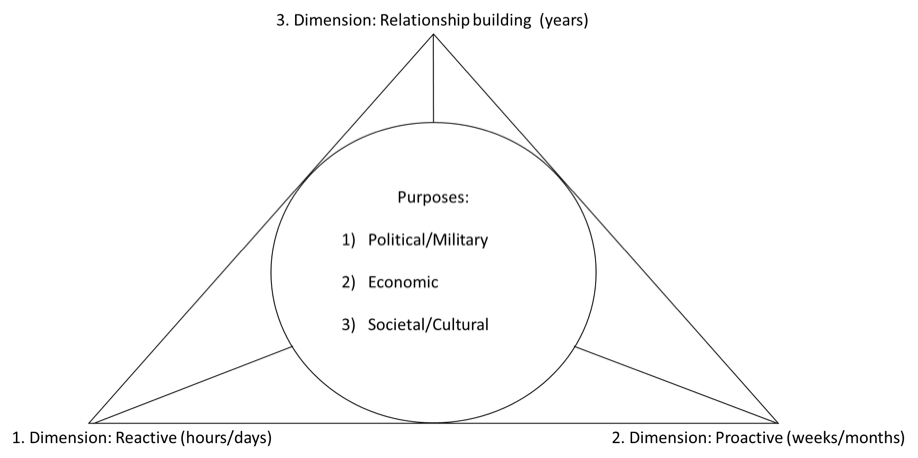
The battle against climate change – Only a simple lip service? The Public Diplomacy of the EU in the battle against climate change
The problems of climate change are omnipresent. The issue polarizes and the public is increasingly sensitized. An example for this is that according to an “Eurobarometer” survey, the European Parliament should give top priority to “Combating climate change and preserving our environment, oceans and biodiversity” (Schulmeister et al. 2019: 38).
In December 2015, at the 21st United Nations Climate Change Conference in Paris, more than 190 parties agreed on a “first-ever universal, legally binding global climate change agreement” (European Commission no date.b). The aim of the Paris Agreement is to mitigate climate change and its consequences. The EU recalls its leading role in brokering the agreement and as a world leader combating climate change (European Commission no date.b). This is the starting point for the following contribution, which analyses the international Public Diplomacy strategy of the EU, with respect to achieving the objectives of the Paris Agreement.
1. Conceptualization of the Public Diplomacy
It is often unclear what is meant by Public Diplomacy because, as Rasmussen confirms, no official definition has yet been agreed on (Rasmussen 2010: 263–287). During the Cold War, Cull described Public Diplomacy as „an international actor’s attempt to conduct its foreign policy by engaging with foreign publics“ (Cull 2008: XV). The aim is to influence the foreign public (Cull 2008: XV). In the meantime, the world order and the diplomacy changed. Beside states, non-governmental organizations (NGOs), International Organizations (IOs), scientists, civil society, and many more actors became part of the diplomacy (Tyler and Sullivan 2014: pp. 426). In the curse of this change the Public Diplomacy but also its actors changed. According to Leonard, Stead und Smewing the goals of Public Diplomacy can be described as follows: (1) Increasing the connection of the foreign society with one’s country, (2) Increasing the esteem for one’s country, (3) Winning the foreign society for one’s country, (4) Influencing the foreign society. To achieve these Public Diplomacy objectives the authors identified three different dimensions and purposes that are shown in the following table (Leonard, Stead and Smewing 2002: pp. 9).
Figure 1: The three dimensions of the Public Diplomacy and its purposes

Source: Own illustration, based on Leonard, Stead, Smewing 2002: 10
The measures differ according to time horizon and purpose (Political/Military, Economic, Societal/Cultural). Reactive measures, such as news management, can be used flexibly and at short notice and refer to developments that influence strategic goals. Proactive measures, like events or a political programme, have a medium-term time horizon and pursue the goal of putting one’s own interests on the political agenda of foreign states in order to influence them. Relationship-building measures, such as regular seminars or conferences, aim to create an atmosphere of trust and security. It is important that Public Diplomacy is not equated with propaganda. While propaganda is characterized by a one-way-communication (sender → receiver), Public Diplomacy is based on a two-way-communication (sender↔ receiver). This difference underlines, how important the identification of target groups and the perception of their interests (“listening”) is in Public Diplomacy (Leonard, Stead and Smewing 2002: 7–20).
2. The Public Diplomacy of the EU in the battle against climate change
As the EU’s Foreign Service, the “European External Actions Service” is responsible for the Public Diplomacy (Courtier 2011: 71, EUR-Lex 2016). One of the external communication objectives is to present the EU as a reliable and effective partner in solving global problems, while promoting the image of the world’s largest cooperation and development aid donor (European Commission and EEAS 2012: pp. 3). This includes in particular issues like climate protection and climate change. Cooperation partner and target groups of the EU’s Public Diplomacy are the media, NGOs, IOs, universities, civil society, the private sector, and many more. Instruments for the implementation are press conferences, press releases, briefings, seminars, events, publications and also the internet and social media presence (European Commission and EEAS 2012: 3–17).
The analysis of the purposes and the three dimensions of the EU’s Public Diplomacy, with respect to achieving the objectives of COP21, leads to the following results. In the period from 01.01.2018 to 18.01.2020, the European Commission (EC) published a total of 585 press releases containing the word “climate change” in a wide variety of contexts (European Commission 2020a).
In the following sections, the previously theoretically described purposes and dimensions of Public Diplomacy are analysed in a practice-oriented manner. The analysis shows that climate change affects all three purposes of Public Diplomacy. The EU’s intensive communication on climate change indicates that the EU has recognised this and taken it into account in its Public Diplomacy strategy, as the following examples show. If climate change continues unchecked, this would have far-reaching negative consequences. The fight against climate change, on the other hand, could even bring economic benefits (“economic purpose”) (European Commission no date.a). Climate change also affects the “political/military purpose”. According to the “Global Strategy for the European Union’s Foreign and Security Policy”, climate change will intensify political and military conflicts (EEAS 2016: 10–37) and is therefore also a significant trigger and driver of migration (EEAS 2017). And also, the “societal/cultural purpose” is affected by climate change. It would affect the health of the population and ultimately that of “the entire planet”, which in turn would have an impact on the social framework within society (European Commission no date.c). The three dimensions are therefore very closely related, influence each other and the boundaries blur. In order to combat climate change and its threats, the EU emphasises that it is fulfilling its COP21 commitments (European Commission 2019b, 2019c). The EU conveys the image of taking on the leading role worldwide in climate protection and driving forward further developments. In connection with the achievement of the COP21 objectives, the EU often mentions the issue of multilateralism and the preservation of the rule-based system. At a time when this system is under threat, the EU is presenting itself as an advocate of the system at international level (European Commission 2019f) and thus wants to be perceived as an efficient and trustworthy global player (Rasmussen 2010: pp. 275).
The following section shows that for implementing its Public Diplomacy strategy, the EU is building on an extensive portfolio of measures, taking into account all three dimensions of Public Diplomacy. The daily and flexibly applicable press releases as well as the internet/social media presence on Facebook, Twitter and Instagram are considered as short-term measures (Reactive). They allow to reach all target groups (European Commission 2020a). Climate protection events attended by official representatives, the media, civil society and other stakeholders are part of the medium-term measures (Proactive). The events allow the EU to build and fulfil its own political agenda. One example for this is the “Climate Diplomacy Week” (European Commission 2020b). In addition, the EU participates in many multilateral and intergovernmental fora on climate change, such as the “UN Climate Change Conferences”, the “One Planet Summit” and others. The EU is taking a leading role in the negotiations (European Commission 2018c, 2018a). The establishment of the EU’s “Multiannual Financial Framework”, covering the period 2021 to 2027, is also considered as a medium-term measure to achieve its strategic objectives. The EC is pushing for a spending target of 25% of the budget to achieve its own climate targets and those of COP21 (European Commission 2018b, 2019d: pp. 5). Results and progress at international conferences and a budget aligned to strategic objectives underpin the EU’s credibility. The aim is to communicate to the international community that the EU is effectively engaged in the fight against climate change. By regularly participating in and organising conferences, training courses, and other specialist forums, the EU aims to implement the long-term dimension of public diplomacy (“relationship building”) and thus create an open and trusting atmosphere. The aim of this is to be perceived as a trustworthy, “principled, reliable, consistent and cooperative global player” (EEAS 2019), in order to build and maintain long-term relationships (Rasmussen 2010: pp. 275, EEAS 2019).
3. Summary and Outlook
In summary, this means that the EU, with respect to achieving the objectives of the Paris Agreement, communicates the following three issues through its Public Diplomacy strategy: (1) The problem of climate change needs to be tackled, (2) The EU is the world leader in climate protection and (3) Global cooperation, multilateralism and a rule-based system are necessary to combat climate change. The extensive portfolio of measures of the EU’s Public Diplomacy strategy allows the EU to put its own priorities, such as climate protection, on the political agenda of foreign states, to influence their society and thus to communicate and advance its own political agenda and interests. In the long term, the EU is trying to present itself as an advocate of multilateralism and the rule-based system in order to be perceived as an efficient and trustworthy global actor. Climate change, which can only be combated globally, is an important instrument in this self-presentation (Rasmussen 2010: 275).
But on closer analysis, it becomes clear that the EU’s Public Diplomacy, in regard to climate protection and the fulfilment of the objectives of the Paris Agreement, is purely intergovernmental information policy. The EU urgently needs to intensify both dialogue and interaction with non-governmental target groups and partners such as media representatives, NGOs, stakeholders and civil society, as well as the perception of their interests (“listening”) (Duke 2013: pp. 7).
Based on these findings, however, the future sounds promising. The new EC published on 11 December 2019 the communication on the “European Green Deal”, which will introduce various concrete legislative projects, such as a European Climate Law. The “Green Deal” aims to transform Europe into the world’s first climate neutral continent by 2050. At the same time, the aim is to meet the obligations of the Paris Agreement and the EU climate targets (European Commission 2019a: pp. 1, von der Leyen 2019: pp. 5). The EC also intends to intensify the communication with the target groups. A “Conference on the Future of Europe” was announced, at which civil society and institutions are going to set future objectives in a joint dialogue (European Commission 2019e: pp. 4).
There is potential, but the quality of implementation is crucial as well as the cooperation of the Member States and European civil society. If successfully implemented, the EU is on a promising path to underpin its communicated self-image, in the area of combating climate change, with concrete action. This would enable the EU to meet its ambitious climate targets and thus underline its credibility and pioneering role in the global community of states.
References
Courtier, A. 2011: The Challenge of Public Diplomacy for the European External Action Service, European Institute of Public Administration [online], Available from: http://aei.pitt.edu/33506/1/20110912112645_EipascopeSpecialIssue_Art14.pdf [Accessed 20 Jan 2020].
Cull, N. J. 2008: The Cold War and the United States Information Agency. Cambridge: Cambridge University Press.
Duke, S. 2013: The European External Action Service and the Quest for an Effective Public Diplomacy, Italian Institute for International Political Studies [online], Available from: https://www.ispionline.it/sites/default/files/pubblicazioni/analysis_216_2013.pdf [Accessed 20 Jan 2020].
EEAS 2016: Shared Vision, Common Action: A Stronger Europe: A Global Strategy for the European Union’s Foreign And Security Policy, EEAS [online], Available from: http://eeas.europa.eu/archives/docs/top_stories/pdf/eugs_review_web.pdf [Accessed 20 Jan 2020].
EEAS 2017: IOM – 108th Session of the Council of the International Organisation for Migration – Item 15: Panel discussion – Opportunities to address migration and climate change in the global compact for safe, orderly and regular migration, EEAS [online], Available from: https://eeas.europa.eu/headquarters/headquarters-homepage/36697/iom-108th-session-council-international-organisation-migration-item-15-panel-discussion_en [Accessed 21 Jan 2020].
EEAS 2019: Statement by High Representative/Vice-President Federica Mogherini on the International Day of Multilateralism and Diplomacy for Peace, EEAS [online], Available from: https://eeas.europa.eu/topics/climate-environment-energy/61324/statement-high-representativevice-president-federica-mogherini-international-day_en [Accessed 20 Jan 2020].
EUR-Lex 2016: Europäischer Auswärtiger Dienst, EUR-Lex [online], Available from: https://eur-lex.europa.eu/legal-content/DE/TXT/?uri=LEGISSUM%3Arx0013 [Accessed 17 Jan 2020].
European Commission no date.a: Benefits of climate action, European Commission [online], Available from: https://ec.europa.eu/clima/citizens/benefits [Accessed 20 Jan 2020].
European Commission no date.b: Pariser Übereinkommen, European Commission [online], Available from: https://ec.europa.eu/clima/policies/international/negotiations/paris_de [Accessed 17 Jan 2020].
European Commission no date.c: Social challenges, European Commission [online], Available from: https://ec.europa.eu/clima/policies/adaptation/how/social_de [Accessed 20 Jan 2020].
European Commission 2018a: One Planet Summit 2018: Europa bekräftigt seine Führungsrolle beim Klimaschutz, European Commission [online], Available from: https://ec.europa.eu/commission/presscorner/detail/de/IP_18_5868 [Accessed 21 Jan 2020].
European Commission 2018b: Supporting climate action through the EU budget, European Commission [online], Available from: https://ec.europa.eu/clima/policies/budget/mainstreaming_en [Accessed 20 Jan 2020].
European Commission 2018c: UN climate talks: EU plays instrumental role in making the Paris Agreement operational, European Commission [online], Available from: https://ec.europa.eu/clima/news/un-climate-talks-eu-plays-instrumental-role-making-paris-agreement-operational_en [Accessed 20 Jan 2020].
European Commission 2019a: COMMUNICATION FROM THE COMMISSION TO THE EUROPEAN PARLIAMENT, THE EUROPEAN COUNCIL, THE COUNCIL, THE EUROPEAN ECONOMIC AND SOCIAL COMMITTEE AND THE COMMITTEE OF THE REGIONS: The European Green Deal, European Commission [online], Available from: https://ec.europa.eu/info/sites/info/files/european-green-deal-communication_en.pdf [Accessed 22 Jan 2020].
European Commission 2019b: Daily News 13 / 05 / 2019, European Commission [online], Available from: https://ec.europa.eu/commission/presscorner/detail/en/MEX_19_2491 [Accessed 20 Jan 2020].
European Commission 2019c: Daily News 25 / 06 / 2019, European Commission [online], Available from: https://ec.europa.eu/commission/presscorner/detail/en/MEX_19_3393 [Accessed 20 Jan 2020].
European Commission 2019d: Entscheidung über den Finanzrahmen der Union für 2021-2027, European Commission [online], Available from: https://ec.europa.eu/commission/sites/beta-political/files/communication-euco-mff-oct2019_de.pdf [Accessed 20 Jan 2020].
European Commission 2019e: Mission letter – Dubravka Šuica: Vice-President-designate for Democracy and Demography, European Commission [online], Available from: https://ec.europa.eu/commission/sites/beta-political/files/mission-letter-dubravka-suica_en.pdf [Accessed 20 Jan 2020].
European Commission 2019f: Remarks by President Juncker at the joint press conference with President Macri in the presence of EU and Mercosur leaders, European Commission [online], Available from: https://ec.europa.eu/commission/presscorner/detail/en/SPEECH_19_3468 [Accessed 20 Jan 2020].
European Commission 2020a: Advanced search, European Commission [online], Available from: https://ec.europa.eu/commission/presscorner/advancedsearch/en?keywords=climate%20change&dotyp=0&parea=0&datepickerbefore=&datebefore=&commissioner=0&datepickerafter=1%20January%202018&dateafter=Mon%20Jan%2001%202018%2000:00:00%20GMT%2B0100%20(Mitteleurop%C3%A4ische%20Zeit) [Accessed 18 Jan 2020].
European Commission 2020b: Events archives, European Commission [online], Available from: https://ec.europa.eu/clima/events/events_archives_en [Accessed 20 Jan 2020].
European Commission, EEAS 2012: INFORMATION AND COMMUNICATION HANDBOOK FOR EU DELEGATIONS IN THIRD COUNTRIES AND TO INTERNATIONAL ORGANISATIONS, European Commission; EEAS [online], Available from: http://eeas.europa.eu/archives/delegations/ghana/documents/press_corner/20121231_en.pdf [Accessed 18 Jan 2020].
Leonard, M., Stead, C., Smewing, C. 2002: Public diplomacy. London: Foreign Policy Centre.
Rasmussen, S. B. 2010: The Messages and Practices of the European Union’s Public Diplomacy. The Hague Journal of Diplomacy [online], 5 (3) :263–287, Available from: http://eds.b.ebscohost.com/eds/Citations/FullTextLinkClick?sid=1c9ee9a9-a88b-42c9-b91b-3d769dd94944@sessionmgr103&vid=2&id=pdfFullText [Accessed 25 Jun 2019].
Schulmeister, P. et al. 2019: PARLEMETER 2019: HEEDING THE CALL BEYOND THE VOTE A STRONGER PARLIAMENT TO LISTEN TO CITIZENS VOICES, European Parliament [online], Available from: https://www.europarl.europa.eu/pdf/eurobarometre/2019/parlemeter-2019-heeding-the-call-beyond-the-vote/report/en-report.pdf [Accessed 16 Jan 2020].
Tyler, M. C., Sullivan, K. 2014: Book review: The Oxford Handbook of Modern Diplomacy., written by Andrew F. Cooper, Jorge Heine and Ramesh Thakur (2013). The Hague Journal of Diplomacy, 9 (4) :426–427.
von der Leyen, U. 2019: Eine Union, die mehr erreichen will: Meine Agenda für Europa [online], Available from: https://ec.europa.eu/commission/sites/beta-political/files/political-guidelines-next-commission_de.pdf [Accessed 20 Jan 2020].

Robert Demendi
Robert holds a Bachelor's degree in "Energy and Resource Management" and specializes in European and German energy and climate policy. After his BA, he completed two internships in Brussels in the field of public affairs. Currently, Robert is pursuing a Master's degree in International Relations - European Studies" at the Andrássy University of Budapest. In the course of his studies he was a trainee at the German Federal Foreign Office, in the Economic Department of the Permanent Representation of the Federal Republic of Germany to the European Union in Brussels. His research interests are in the field of various EU policies, public diplomacy and the foreign and security policy of the EU.
